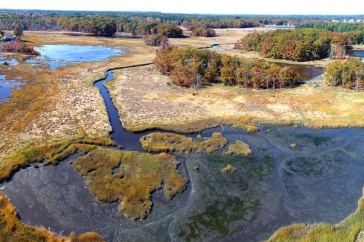
David Fredriksson has been selected to lead the new UNH Sustainable Seafood Center — a hub at the nexus of food security, climate change adaptation and ecological protection. He joins an already robust team of UNH faculty and staff who are committed to finding solutions to these pressing challenges.
Fredriksson, who was most recently a professor and the director of ocean engineering at the United States Naval Academy in Annapolis, Maryland, will guide efforts to strengthen UNH’s position as a leader in sustainable seafood and build on decades of collaboration between scientists and the regional aquaculture and fishing industries. The new center is a joint effort between the UNH College of Engineering and Physical Sciences (CEPS) and the UNH School of Marine Science and Ocean Engineering (SMSOE) with funding provided by a $5 million gift made through the Emily Landecker Foundation.

“The time is now to change the paradigm of ocean resource utilization, especially from fisheries and aquaculture,” Fredriksson says. “We must take a technical but holistic design approach to develop sustainable seafood systems that enhance both communities and ecosystems. With this generous gift and the capabilities of CEPS and SMSOE, the new Sustainable Seafood Center will be able to do this through education and action. I am incredibly optimistic and excited for this opportunity.”
“We are thrilled that the joint hire of Dr. Fredriksson will strengthen the connection between CEPS and SMSOE by integrating our substantial marine assets with new and existing academic programming to advance sustainable aquaculture in our region,” says Cyndee Gruden, dean of CEPS. “The CEPS community embraces this tremendous opportunity to mitigate the environmental and social impacts commonly associated with the seafood sector through our direct involvement in the Sustainable Seafood Systems Center.”
The creation of this center comes at a critical time for the Gulf of Maine; faced with climate change and relatively shallow depths that absorb heat quickly, its waters are warming faster than almost anywhere on Earth. The Gulf’s fishing industry — a billion dollar per year industry — is already feeling some climate-related effects. Separately, low-lying coastal communities are also at risk of rising seas and food insecurity. Diane Foster, director for SMSOE, sees an opportunity to tackle these challenges by leveraging UNH’s unique strengths and collaborations with the formation of the new Sustainable Seafood Center.
"The time is now to change the paradigm of ocean resource utilization, especially from fisheries and aquaculture."
“A critical strategy for feeding our global communities is to develop aquaculture system technologies and methodologies that are more productive and less impactful to the natural environment.” Foster says. “It’s rare to find interdisciplinary ocean engineering and marine scientists who are actively collaborating on next generation aquaculture systems to identify solutions for marine mammal safe lines, innovative and low impact feeding technologies or storm-proof dynamic structures. UNH is distinguished by its longstanding connection between our engineers, aquaculture specialists, and commercial fishers.”
Under Fredriksson’s guidance, the focus of the Sustainable Seafood Center will be twofold: To conduct research that advances technologies for more environmentally friendly seafood offerings, and to develop academic programming that connects UNH to this research, Foster adds.
UNH’s facilities are already benefitting from the financial gift: SMSOE purchased a specialized service vessel to improve access to offshore aquaculture sites and a vehicle to transport saltwater from the coast to labs on UNH’s Durham campus. There are also plans to purchase new fisheries and aquaculture equipment for the research conducted at the Coastal Marine Lab in New Castle. The UNH open ocean aquaculture site, located just a short boat ride from the lab, was recently outfitted with underwater hydrophones that will provide information on any marine mammal encounters that may occur; the site will be an important part of the Sustainable Seafood Center’s research and education efforts moving forward.
Fredriksson will work closely with a team of researchers at UNH and New Hampshire Sea Grant (NHSG), including: Elizabeth Fairchild, a research associate professor in the UNH department of biological sciences; Michael Chambers, a research associate professor with SMSOE; Linas Kenter, aquaculture and fisheries research scientist with SMSOE and NHSG; Erich Berghahn, aquaculture project manager with NHSG; and Michael Doherty, a SMSOE research assistant.
-
Written By:
Rebecca Irelan | Institute for the Study of Earth, Oceans, and Space | rebecca.irelan@unh.edu | 603-862-0990
















































